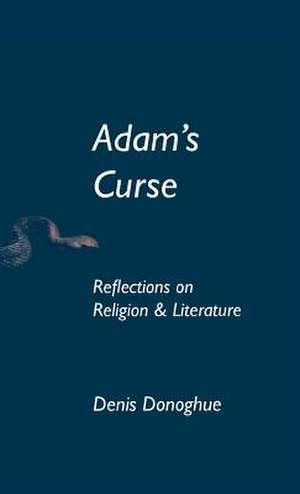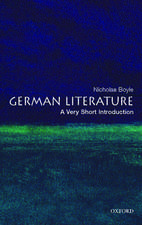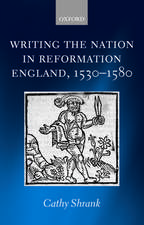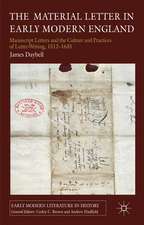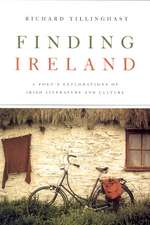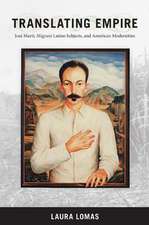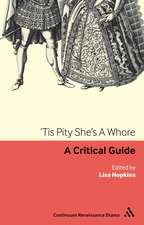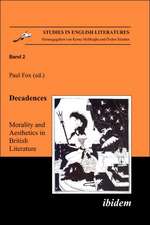Adam`s Curse – Reflections on Religion and Literature: Erasmus Institute Books
Autor Denis Donoghueen Limba Engleză Hardback – 22 apr 2001
In the spring of 1999 distinguished literary critic Denis Donoghue inaugurated the Erasmus Lectures at the University of Notre Dame under the title ADAM'S CURSE. This book is the text of those lectures, revised and extended.
W. B. Yeats's poem "Adam's Curse" provides Donoghue with motif and incentive. In Genesis God says to Adam: "Because thou hast harkened unto the voice of thy wife, and hast eaten of the tree, of which I commanded thee, saying, Thou shalt not eat of it: cursed is the ground for thy sake; in sorrow shalt thou eat of it all the days of thy life." Yeats put it this way: "It is certain there is no fine thing / Since Adam's curse but needs much labouring." Based on a conversation he had with his beloved Maud Gonne and her sister Kathleen, Yeats's poem thinks about how difficult it is to be beautiful, to write great poetry, to love. In his Erasmus Lectures, Donoghue thinks about the lasting difficulties involved in understanding, and living with, cultural, literary, and religious values that are in restless relation to one another.
On these and related matters, Donoghue enters into conversation with a variety of writers, some of them—John Crowe Ransom, Hans Urs von Balthasar, William Lynch, Alasdair MacIntyre, Emmanuel Levinas, Andrew Delbanco, and Robert Bellah—signaled by the titles of the seven lectures. Into the thematic space suggested by each of these titles Donoghue invites other writers and sages to join the conversation—Henry Adams, William Empson, John Milbank, Czeslaw Milosz, Seamus Heaney, Gabriel Josipovici, and many more. The "talk," as you might expect, keeps coming around to the reading of specific literary texts: passages from Paradise Lost, Stevens's "Esthétique du mal," fiction by Gide and J. F. Powers and J. M. Coetzee, to name only a few. In ADAM'S CURSE, Donoghue brings his special intelligence to bear on some of the intersections where religion and literature provocatively meet.
W. B. Yeats's poem "Adam's Curse" provides Donoghue with motif and incentive. In Genesis God says to Adam: "Because thou hast harkened unto the voice of thy wife, and hast eaten of the tree, of which I commanded thee, saying, Thou shalt not eat of it: cursed is the ground for thy sake; in sorrow shalt thou eat of it all the days of thy life." Yeats put it this way: "It is certain there is no fine thing / Since Adam's curse but needs much labouring." Based on a conversation he had with his beloved Maud Gonne and her sister Kathleen, Yeats's poem thinks about how difficult it is to be beautiful, to write great poetry, to love. In his Erasmus Lectures, Donoghue thinks about the lasting difficulties involved in understanding, and living with, cultural, literary, and religious values that are in restless relation to one another.
On these and related matters, Donoghue enters into conversation with a variety of writers, some of them—John Crowe Ransom, Hans Urs von Balthasar, William Lynch, Alasdair MacIntyre, Emmanuel Levinas, Andrew Delbanco, and Robert Bellah—signaled by the titles of the seven lectures. Into the thematic space suggested by each of these titles Donoghue invites other writers and sages to join the conversation—Henry Adams, William Empson, John Milbank, Czeslaw Milosz, Seamus Heaney, Gabriel Josipovici, and many more. The "talk," as you might expect, keeps coming around to the reading of specific literary texts: passages from Paradise Lost, Stevens's "Esthétique du mal," fiction by Gide and J. F. Powers and J. M. Coetzee, to name only a few. In ADAM'S CURSE, Donoghue brings his special intelligence to bear on some of the intersections where religion and literature provocatively meet.
| Toate formatele și edițiile | Preț | Express |
|---|---|---|
| Paperback (1) | 231.00 lei 6-8 săpt. | |
| MR – University of Notre Dame Press – 22 apr 2001 | 231.00 lei 6-8 săpt. | |
| Hardback (1) | 584.96 lei 6-8 săpt. | |
| MR – University of Notre Dame Press – 22 apr 2001 | 584.96 lei 6-8 săpt. |
Preț: 584.96 lei
Preț vechi: 759.69 lei
-23% Nou
Puncte Express: 877
Preț estimativ în valută:
111.94€ • 119.69$ • 93.33£
111.94€ • 119.69$ • 93.33£
Carte tipărită la comandă
Livrare economică 18 aprilie-02 mai
Preluare comenzi: 021 569.72.76
Specificații
ISBN-13: 9780268020095
ISBN-10: 0268020094
Pagini: 190
Dimensiuni: 149 x 222 x 22 mm
Greutate: 0.39 kg
Ediția:1
Editura: MR – University of Notre Dame Press
Seria Erasmus Institute Books
ISBN-10: 0268020094
Pagini: 190
Dimensiuni: 149 x 222 x 22 mm
Greutate: 0.39 kg
Ediția:1
Editura: MR – University of Notre Dame Press
Seria Erasmus Institute Books
Recenzii
“Denis Donoghue seems to me the most deeply learned and thoughtful of contemporary literary and philosophical critics. Adam's Curse is one of his very finest books—a broad confrontation with matters of immense importance and, given the complexity of its argument, argued in a prose of a blessed, all-but-vanished lucidity.” —Reynolds Price
“Vintage Donoghue. Rich in conception, deft in execution, astringent in analysis, lucid in exposition, ecumenical in its curiosity and engagingly contra suggestible.”—Francis Oakley
“Donoghue delivered these eight pieces as lectures in March and April 2000 and doesn’t claim they are comprehensive or ‘even consecutive’ on their subject. Instead of a systematic philosophical treatise, they are a series loosely woven around a title borrowed from Yeats and directed by a ‘governing prejudice’ attributed to Coleridge—that ‘a fall of some sort or other ... is the fundamental postulate of the moral history of man.’ Donoghue sees himself going against the grain, reflecting on those two vagabonds, religion and literature, in the none-too-easy works of Emmanuel Levinas, Wallace Stevens, Robert Bellah, Alasdair McIntyre, Czeslaw Milosz, Seamus Heaney, and Charles Baudelaire. His is an appropriate stance for a critic, though in the end its tone is as defensive as it is critical. He richly explores an impressive range of writings as he defends the transcendence of analogy as opposed to the immanence of metaphor. Agreeing with him isn’t necessary to benefit from traveling with him through the literary landscape he surveys.” —Booklist
Notă biografică
Denis Donoghue is Henry James Professor of English and American Letters and University Professor at New York University. He is the author of more than twenty books, including Words Alone: The Poet T. S. Eliot (2000), The Practice of Reading (1998), and Walter Pater: Lover of Strange Souls (1995).
Descriere
Descriere de la o altă ediție sau format:
W.B. Yeats's poem “Adam's Curse” provides Donoghue with motif and incentive. In his Erasmus Lectures, Donoghue thinks about the lasting difficulties involved in understanding, and living with, cultural, literary, and religious values that are in restless relation to one another.
W.B. Yeats's poem “Adam's Curse” provides Donoghue with motif and incentive. In his Erasmus Lectures, Donoghue thinks about the lasting difficulties involved in understanding, and living with, cultural, literary, and religious values that are in restless relation to one another.
